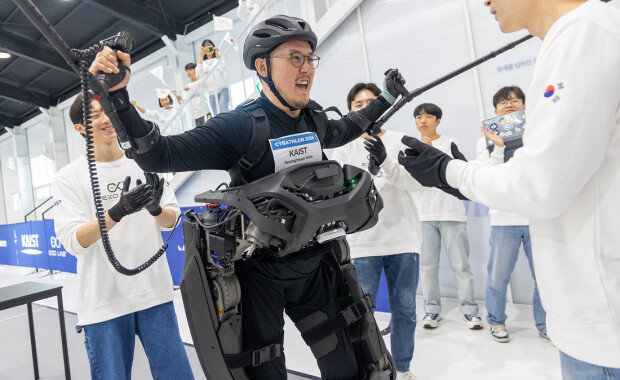KAIST’s wearable robot wins second consecutive Cyborg Olympics
KAIST’s wearable robot wins second consecutive Cyborg Olympics
Posted October. 29, 2024 07:54,
Updated October. 29, 2024 07:54

A new wearable robot developed by KAIST researchers has won the Cybathlon 2024, a robotics technology contest for overcoming disabilities. The competition, which is held every four years and is often referred to as the “Cyborg Olympics,” was won by KAIST for the second time in a row, following its victory in 2020.
According to KAIST on Monday, a joint research team from EXO-LAB, Move Lab, and Angel Robotics, led by Professor Kong Kyoung-chul of the Department of Mechanical Engineering at KAIST, won the wearable robot category of the competition on Sunday by developing a new wearable robot for people with paraplegia called WalkON Suit F1.
WalkON Suit F1 enables the robot to walk on its own and dock to a wheelchair, allowing the wearer to put the robot on themselves. Six channels of ground reaction force sensors on the feet measure the robot’s balance 1,000 times a second to keep it balanced, and an artificial intelligence (AI) control board implementing a neural network provides situational awareness.
In the wearable robot category, a paraplegic walks and performs various tasks while completely dependent on the robot. The challenging tasks included walking sideways between narrow chairs, carrying a box, walking freely without a cane, walking through a door, and using both hands to cut with a knife, all within a 10-minute time limit. The KAIST team completed all of them in six minutes and 41 seconds. “I am thrilled to be able to showcase South Korea’s wearable robotics technology with my body,” said Kim Seung-hwan, a paraplegic team member. “In the last competition, KAIST’s team completed all the tasks so quickly that there were even questions about whether Kim Byung-wook, a paraplegic member, was indeed paralyzed,” said KAIST.
The BeAGain team, led by Professor Shin Dong-joon at Yonsei University’s Department of Mechanical Engineering, also won the gold medal in the category of robotic bicycles for functional electrical stimulation (FES) rehabilitation. In the category, a paraplegic rider must complete a 1,960-meter-long track in the fastest time on a robotic bike to win. The team won the gold medal with a record of six minutes and two seconds, beating the defending champion from the Netherlands.
장은지 기자 jej@donga.com







